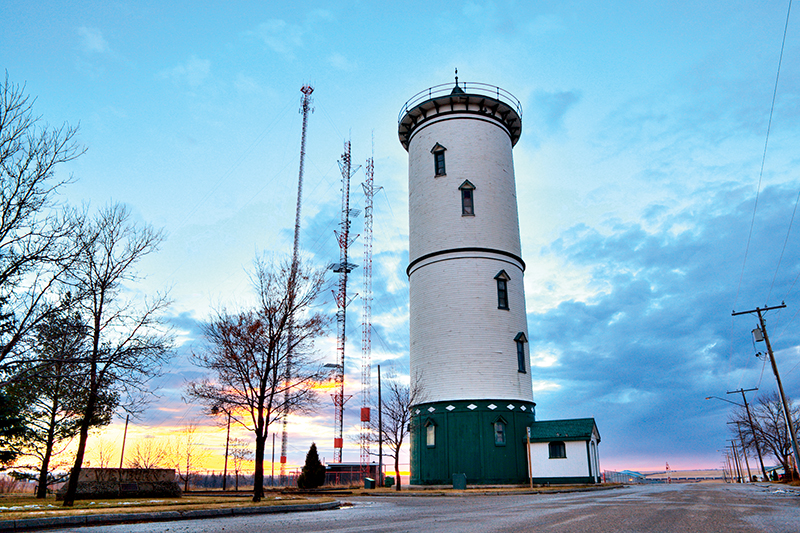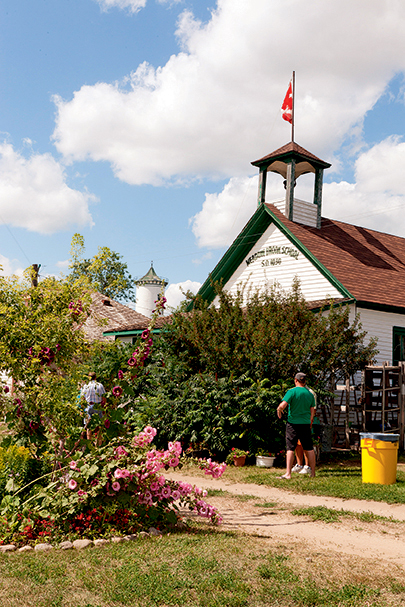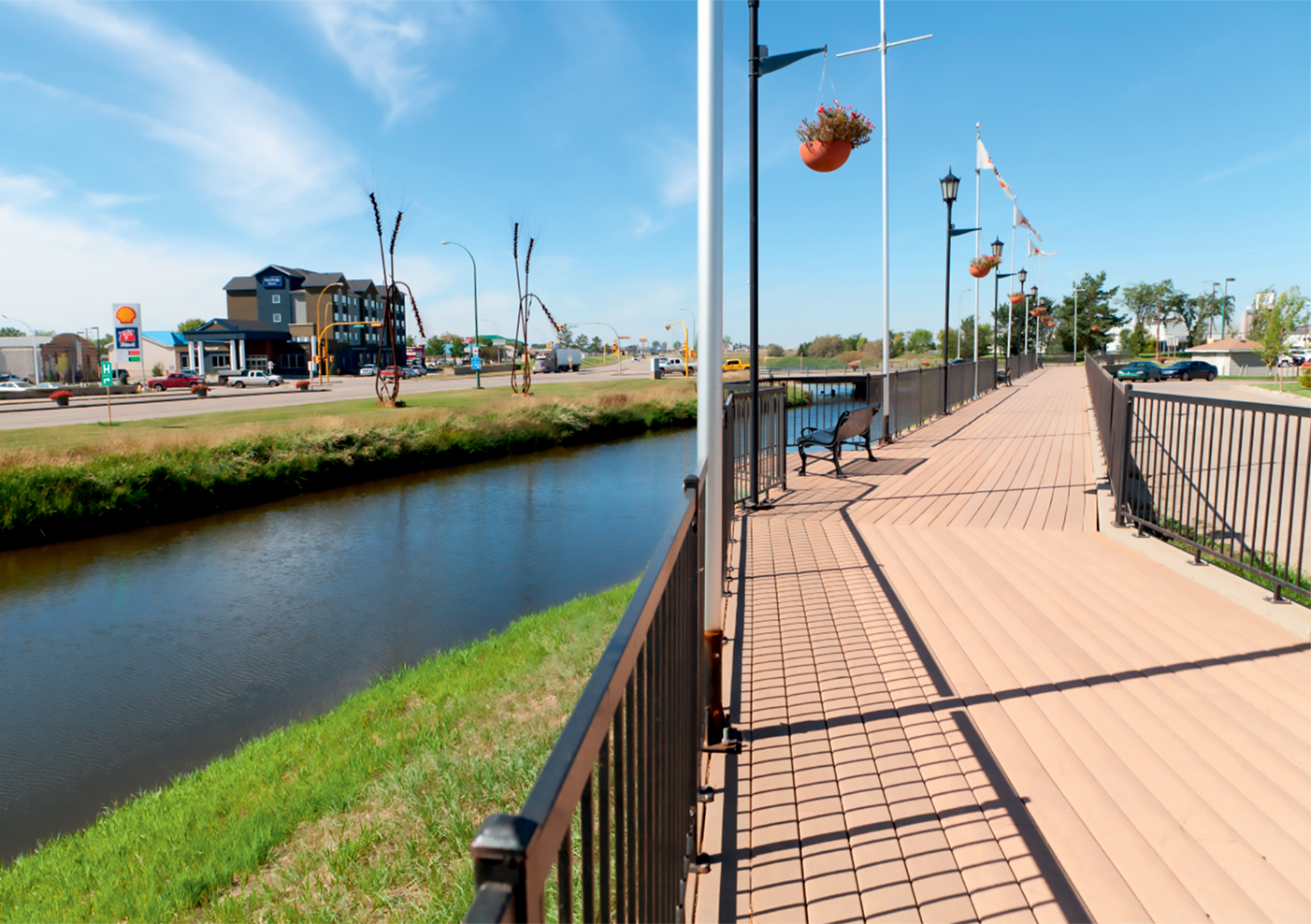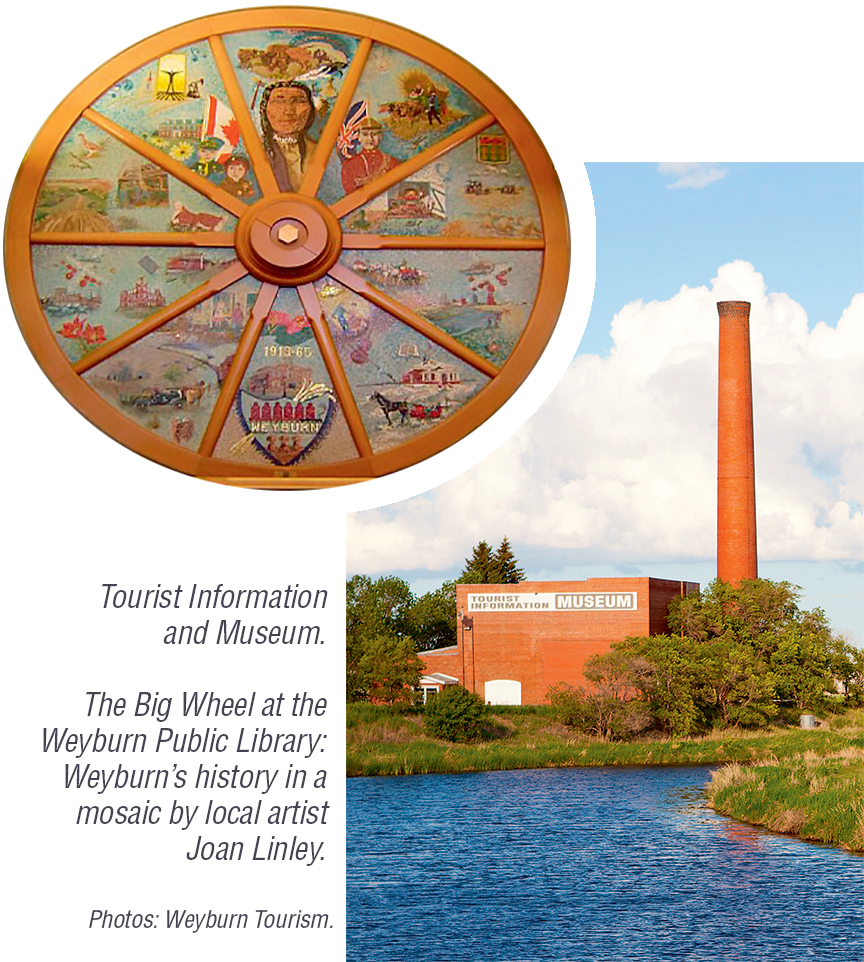Canada’s Top Retirement Destinations
By Wendy Haaf

The Water Tower. Photo : Weyburn Tourism.
Before Heather van der Breggen, at the time a top Calgary real estate agent, accompanied her second husband, Abraham, to his hometown of Weyburn, SK, for the first time, she couldn’t have imagined settling in a small town in the Prairies, much less foreseen that her parents would eventually follow her.
“I was an arrogant Albertan who believed all the people who went to Saskatchewan and said there was nothing there,” she recalls.
However, van der Breggen immediately fell under the spell of Weyburn’s green-and-gold prairie landscape and relaxed, friendly atmosphere. “It was so beautiful,” she recalls. “There are so many lakes here. Rich and poor, everybody enjoyed the cottage life.”
For the price of a house in Calgary, in 2001 the van der Breggens bought a century home on 80 acres (32 hectares). “I could have my horses right outside the door,” Heather says. “I loved it.”
The lower cost of living also freed van der Breggen, now 60, to work fewer hours and to explore her passion for art, which is now her full-time vocation. In terms of her lifestyle, “I was retired as soon as I moved here,” she says.
When her parents, then in their 80s, followed in 2005, “it was absolutely the best decision they ever made,” she says.
 Rich in Arts and Culture
Rich in Arts and Culture
Weyburn has so much going for it that in 2016, MoneySense magazine named the city of roughly 11,000 “The Best Place to Live in the Prairies,” and in 2017, the fifth-best place to live in Canada. For one thing, homes here are among the most affordable in Saskatchewan—costing an average of $240,547 in 2016. Appropriately for the hometown of Tommy Douglas, the city also has high-quality, accessible health care, with a 100-bed hospital, mental-health services, and a variety of specialty clinics. “We have a good supply of doctors,” many of whom accept new patients, says Dorothy Whitell, 83.
Proximity to three major highways and the US border make travel convenient, as does a local bus line that operates a monthly casino outing to Regina (about an hour’s drive away). A selection of stores supplies most shoppers’ needs, while bars, bistros, and restaurants offer a range of options for dining out.
The birthplace of author W.O. Mitchell, Weyburn is also rich in arts and culture. “There’s a lot going on here for a place this size,” notes Whitell, a member of the long-established Hill Top Painters group. “I never have a dull moment!” In addition to housing studios equipped with kilns and potter’s wheels, the Signal Hill Arts Centre offers classes in everything from plein-air sketching to printmaking. “Artists from all over come to teach,” Whitell says.
Weyburn is also home to three art galleries, a well-equipped library, a regional college campus, groups centred on activities ranging from writing and carving to quilting, and two museums, as well as a summer concert series and several festivals. Now in its fifth and final year, Art Farm, which is held on van der Breggen’s property, attracts 3,000 visitors and was the runner-up for Tourism Saskatchewan’s “event of the year,” against such competitors as the Saskatoon Air Show.
From facilities to organizations, there are also multiple options for staying physically and socially active. “We have Wheatland Senior Centre and lots of service clubs,” notes Twila Walkeden, executive director of the Weyburn Chamber of Commerce. “We also have a leisure centre, which houses our pool.” Two ice rinks, a golf course, tennis courts, multiple private fitness facilities (including a yoga studio), plus workshops in such pastimes as Nordic walking and pickleball (offered by the district chapter of the Saskatchewan Senior Fitness Association) offer enough variety to keep even the most easily bored exercise enthusiast engaged. In addition, a system of paved trails called Tatagwa Parkway snakes through parkland along the river, from one end of town to the other. “It’s a very walkable city,” Walkeden says.
Living within walking distance of amenities was among the things that drew van der Breggen’s parents here from suburban Calgary, where her father worried what would happen if he became unable to drive. Approaching the move as an adventure, the elder couple flourished, soon enmeshing themselves in the fabric of the community. “I was surprised at the social network my dad became involved in, because he was always the quiet one,” Heather recalls. At 80-plus, 20 years after last being on a bike, Heather’s father bought one to ride along the parkway.

Heritage Village.
Photo : Weyburn Tourism.
Unfortunately, the year after the elder couple moved, Heather’s mother was diagnosed with dementia, which progressed quickly. A compassionate nursing home director made a home visit to personally and gently explain to Heather’s father, who was reluctant to consider long-term care for his wife, why it might be better to do so earlier rather than later.
While care in a comparable facility in Calgary can cost $6,000 a month, “here, the cost is based on your income,” van der Breggen says. Fortunately, her mother quickly adapted to the homelike environment of the facility.
“When we moved here, our friends in Calgary thought we were nuts,” van der Breggen says. “‘Why in the world would you be going to some one-horse town to live in the middle of nowhere?’ they asked us. But it really is a little haven.”
Dorothy Whitell couldn’t agree more: “When I do go to Regina, I’m glad to come home to Weyburn.”

Heritage Village. Allie Griffin Art Centre.



 Rich in Arts and Culture
Rich in Arts and Culture
